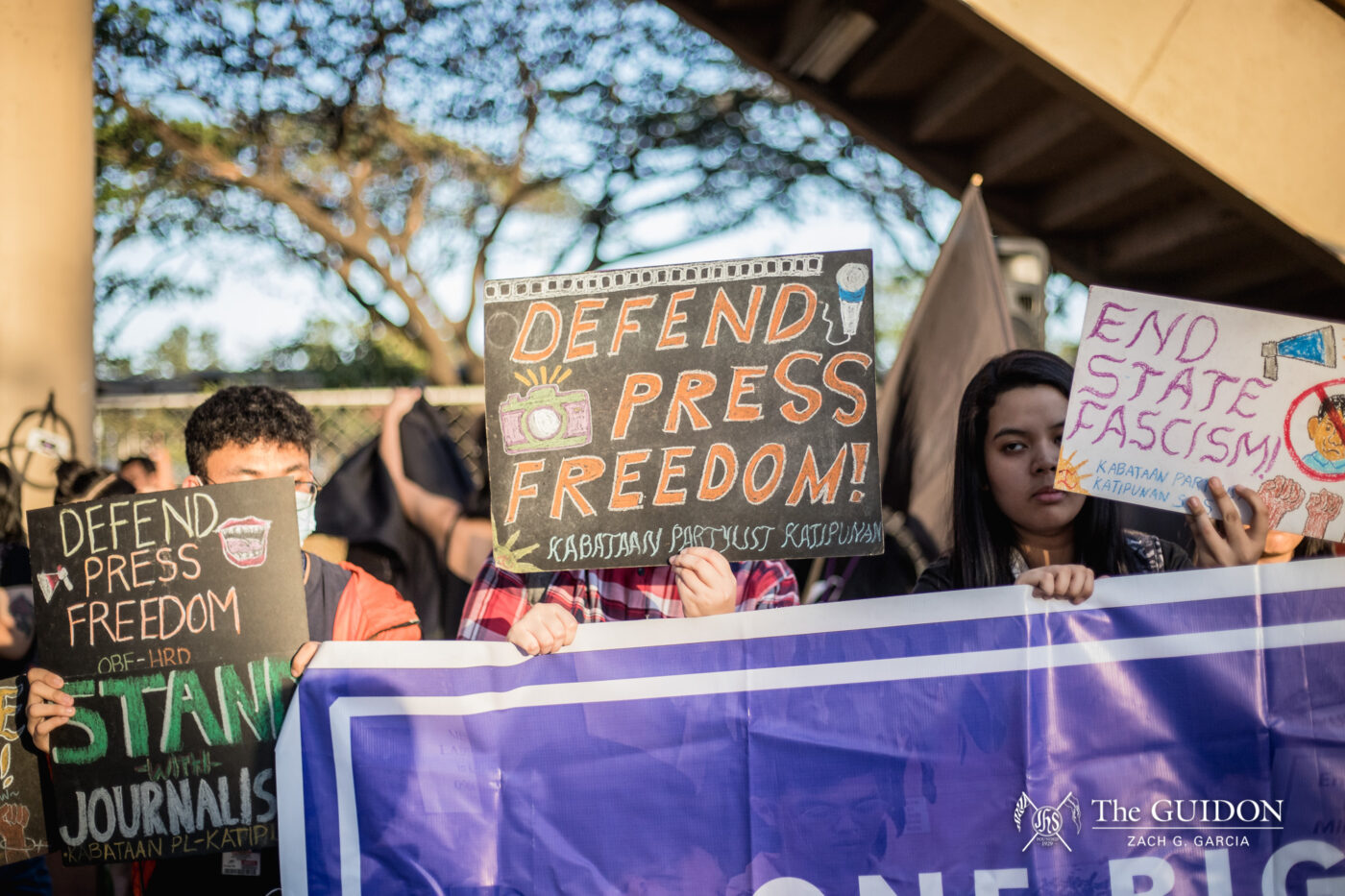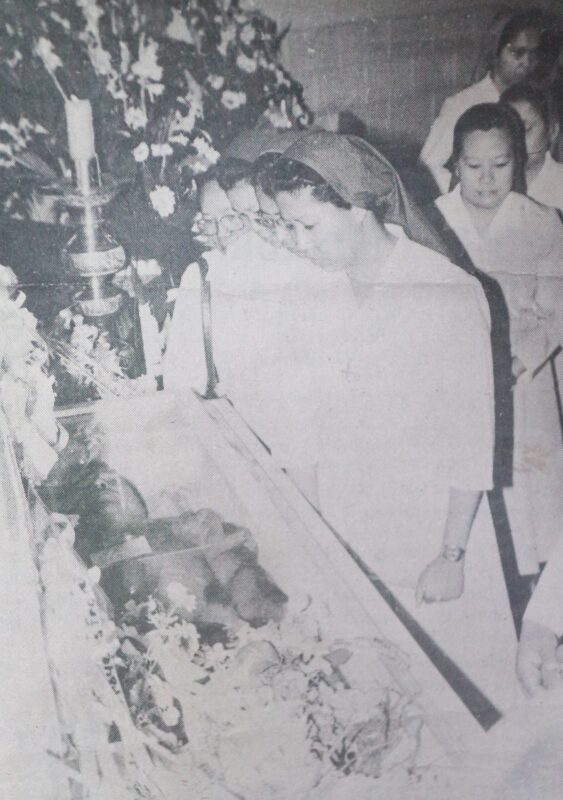Editor’s Note: The following article is taken from The GUIDON Volume 51, Number 5, originally published February 1984.
If only a President, particularly President Marcos, understands and appreciates some fundamental truths…
The first of these truths is that a man undergoes an inner change the moment he steps into the presidency and begins to enjoy his privileges and exercise his vast powers…
The second is that because of this change, Presidents soon acquire an insatiable appetite for praises and [favorable] comments, The least critical observation on the vast discrepancy between promise and performance is considered asinine and ill-informed—the mildest structure on the flatulence of leadership or on the ruthlessness of that leadership is classified as subversive and its authors become fair game in the intrusion into privacy…
-L.P Soliongco, February 17, 1967
Beyond Soliongco’s 1967 protest against the arbitrary nuances of national leadership, the principle of sovereignty has since been subject to arguments which question the validity of its possession (Renato Constantino, Soliongco Today – a Contemporary From the Past, 1981). Martial Law vested the military with powers so complete that the society in itself was faced with a structure of strict obedience to authority, often at the sacrifice of independent moral [judgment]. This, coupled with the New Society’s stress upon national security, set the stage for the determination of the forces of power, and inevitably for the alteration of the outlook of the “sovereign” people, and, consequently, for the flow of journalistic activity (Marcelo Soriano, The Quiet Revolt of the Philippine Press, 1981). “Subversive” became a term often bandied about but never quite defined by those who act upon it.
The question then is one of degree: to what extent is subversion determined by the forces in power? What role does such a body play in the judgment of what is threatening to national security?
In the Philippines, freedom of the press—a democratic principle where democracy can claim no base since democracy has no Asian referent—is barely understood (I.P. Soliongco, “An Image-oriented Society,” Manila Chronicle, 1968). The standard of the West is purely academic in Asia. As one of the great democratic rights, press freedom in the early American era had been appropriated by the Americans for their exclusive use. Following the example of their predecessors—the Spanish colonial lords of 300 years—the Americans had for their first concern the possible opposition of a people who had just undergone revolution, established their own democratic government, and [wrote] their own constitution (Agoncillo and Guerrero, History of the Filipino People, 1970). Consequently, having curtailed the people’s right to information, the Americans, through the almost all-American Philippine Commission, promulgated a sedition law more repressive than the US Sedition Act of July, 1978. A decade later, having achieved their economic goals and calmed errant Filipinos to cooperative complacency, the Americans “gifted” the country with the democratic principles of freedom of the press, speech, and of assembly—though still catering, in some degree, to their colonial requirements.
Thus it becomes apparent that the denial to the right of expression dons a prevalent role in Philippine history. Freedom of the press has become a battlecry of a generation hungry for the fulfillment of its need to openly and without fear voice its beliefs.
Today, whenever a discussion on freedom of the press is attempted, it is imperative that a distinction be made on two levels of definition: the level of the principle per se and the level of concrete reality. The major implication of this, briefly, is that the theory of press freedom is often illusory in nature and may have to be grounded in the context of immediate publisher interests, for these are of primary concern and, ahead of some other requirements, must be catered and attended to.
At this point, the role of government re-emerges as a factor upon which a newspaper’s publication depends to a great extent. Specifically the government functions as the controlling arm that releases funds and issues licenses to the publisher. Thus the latter’s survival is intrinsically linked to the former’s approval. The nationalization of major dailies upon the declaration of martial law has created a dependency relationship between the Philippine press and government which may have effectively axed the growth of the nation’s journalism.
Media is a useful tool of governments since it is through media that the government may channel the exercise of its powers. Information and persuasion are devices essential to governments which media can best provide (Robert Murphy, Mass Communication and Human Interaction, 1977). These are essential in maintaining image and peace within the regime. “People must be persuaded to obey laws” just as they must be kept informed of events and issues which may be crucial to government interests. Other devices used by governments which closely relate to persuasion are punishment and reward—an ominous thought which constantly hovers in the minds of recalcitrant journalists. Media allows for the steady contact between the governing and the governed. This relationship of government to media is a critical one therefore, and examining the limits of press freedom has become necessary in order that freedom may be preserved.
The assassination of opposition leader Benigno Aquino on August 21, 1983, has sparked incomparable protest from most of the once-complacent hordes of people that comprise the whole range of Philippine society. Collective indignation has inspired a new movement in the assertion of one’s rights, a phenomenon clearly evident in the current boom of tabloids that sport such banners as Malaya, Philippine Free Press, the Guardian, and La Solidaridad.
Already, the management of these tabloids claim that attempts to discredit them are being made by the government. For example, a fake issue of Malaya was found circulating all over Manila—a watered-down version of the publication. The opposition asserts that these copies have their sources among forces close to the present administration (Sylvia Mayuga, speech at Luneta Grandstand Rally, November 27, 1983).
In addition, there have been many arrests of labor union members and journalists for charges of subversion. Thirty-nine workers/unionists have been arrested and detained since August 1982 on charges of being “subversives” and “economic saboteurs” (Lorna Kalaw-Tirol, “Detainees’ Families” Task Force for Detainees,” “Military Side of Detainee Issue,” Panorama, 11/13/83). Col. Eduardo R. Ermita of the Office of Detainee Affairs for Minister of National Defense Juan Ponce Enrile explicitly stated in the interview that “no person has been detained merely on the basis of his or her political beliefs and that all those detained are charged with crimes against national security and public order as provided by law.”
Tirol’s articles illustrate the insufficiency of Col. Ermita’s legal definition of subversion: Carlos Benosa, wage-earner at a tin can factory, arrested on charges of subversion for possessing copies of the labor publication Bawis; Alfredo Mansos, factory worker, arrested on charges of subversion for attending a labor meeting; Charlie Palma, labor organizer of the National Federation of Labor; Marie and Rene Marciano, husband and wife, both suspected of connections with Marie’s boss, Eduardo Olaguer—all accused of that elusive term: subversion. The aforementioned examples are all labor-related cases. Much more common though not mentioned in Tirol’s articles were the detention of journalists for the same charges.
These and other cases of political arrests and detentions have been known to the public for quite some time. It is only now however, with the increase in political awareness brought about by the Aquino assassination, that Filipinos are becoming bolder in questioning the validity of such arrests and detentions.
Information is power and realizing this, it is the ploy of totalitarian governments to seize the functions of distributing information, controlling the media systems and consequently [affecting] boundaries to the paths the press may dare tread. In the effort to maintain popular sovereignty, the right to information must remain with the people. It is this prospect, and the bleak [specter] of the Philippines’ rapidly deteriorating conditions and diminished state of press freedom, that prompts the delving into the concept of subversion in the context of today’s journalism in the hope that truth may be salvaged, and a semblance of true freedom may be restored. There is an urgent need to scrutinize the mechanisms that lubricate the Philippine press. The cardinal principle of democracy, after all, is the people’s right to know.







